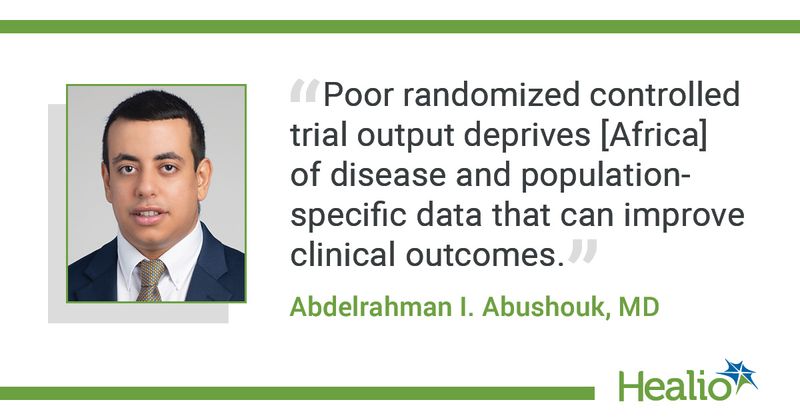Cardiovascular
Study an ‘eye-opener’ to the lack of African-led cardiovascular research
August 22, 2023
3 min read
Source/Disclosures
Published by:
Disclosures:
The authors report no relevant financial disclosures.
Key takeaways:
- Only 179 African-led CV trials were published between 1990 and 2019, of which many lacked funding and had elevated risk for bias.
- These data are a ‘wake-up call for the global heart health community.’
Improved training and research funding is needed to position Africa on the global stage of CV research, which is missing large swaths of clinical data on its large and diverse patient populations, researchers reported.
Overall, Africa contributes approximately 2% of published and/or registered clinical trials, according to data published in QJM: An International Journal of Medicine.
Abdelrahman I. Abushouk, MD, hospital resident in the department of internal medicine at the Yale School of Medicine, and colleagues aimed to better characterize and identify barriers to the conduct of African-led CVD research.
The findings were published in Circulation: Cardiovascular Quality and Outcomes.
“Poor randomized controlled trial output deprives the continent of disease and population-specific data that can improve clinical outcomes,” Abushouk told Healio. “It hurts cardiology research at large, which is missing out on a massive, diverse, treatment-naive population.”
The paucity of African-led research
The researchers conducted a PubMed search and identified 179 eligible trials for which planning and management activities were conducted in African centers between 1990 and 2019.
Overall, 82.1% of these trials originated from Egypt, South Africa and Nigeria.
Out of 54 African countries, 68.5% contributed no published trials between 1990 and 2019.
The number of African-led trials has increased in recent years, with 41 trials contributed between 1990 and 1999, 30 between 2000 and 2009 and 108 between 2010 and 2019, the researchers wrote.
African centers contributed to the implementation of 45 multinational trials during the study period, with the most (n = 16) being contributed by South Africa.
The most frequent themes of African-led CVD research were CVD prevention, followed by ischemic heart disease management and HF and transplantation, according to the study.
The researchers observed that African-led trials generally had small sample sizes (median, 59 individuals), few participating centers (median, 5 centers) and short follow-up periods (median, 12 weeks).
Publications from South Africa had the highest impact score, followed by Egypt and Nigeria, while 52.5% of trials were published open-access.
The median journal impact factor of African-led trials was 3.4 and the median citation count on Google Scholar was 22, according to the study.
Among trials that provided sufficient data for assessment of bias by the Cochrane ROB 2.0 tool, 48.5% were unclear while 49% had high risk for bias.
Moreover, 91 trials did not disclose receiving funding and 20 disclosed no external funding, according to the study.
‘The need to support and collaborate’

Ahmed Bendary
“This research letter is an ‘eye-opener,’ and a wake-up call for the global heart health community,” Ahmed Bendary, MD, FESC, associate professor of cardiovascular medicine at Benha University, Benha, Egypt, told Healio. “It shows that despite the growing heart disease burden in Africa, there’s been limited research from the continent. This should make us realize the need to support and collaborate with African researchers, so we can work together to tackle heart disease more effectively worldwide. It’s time to bridge the gap and make a real impact on heart health for everyone.
“To increase Africa’s presence in CV research, addressing barriers such as limited resources, inadequate training, regulatory challenges and funding constraints is crucial,” Bendary said. “Strategies to boost the continent’s global standing include investing in research infrastructure, building capacity through training programs, streamlining regulations, increasing funding support, fostering international collaborations, promoting open-access publishing, advocating for research prioritization and raising awareness about CV research’s importance. By implementing these measures, Africa can enhance its research output and contribute significantly to global CV knowledge and advancements.”
For more information:
Abdelrahman I. Abushouk, MD, can be reached at [email protected].
Ahmed Bendary, MD, FESC, can be reached at [email protected].

